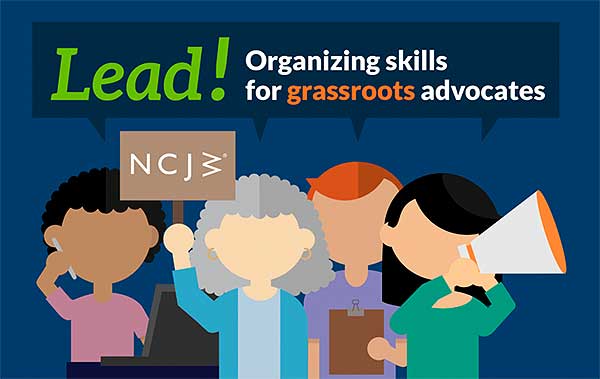Advocacy Tools

Tzedek, Tzedek Tirdof: Tools of Transformation Webinar Series
Gain new skills and knowledge through NCJW National’s advocacy and organizing webinar series
What are you looking to learn about?

- Understanding power through advocacy, organizing, and activism
- Engaging activists through relational meetings
- How to identify and develop leaders
- How to write a letter to the editor
- Learn how to answer (and ask) difficult questions
- How to have a successful lobby visit
- How to best engage in advocacy work as a 501(c)(3) nonpartisan organization
- How to build your advocacy base
- Why midterms matter
- How to use phone banks to drive voter turnout
- CourtsMatter to voting rights

Advocacy Tools
WRITE * CALL * VISIT
- If policy makers are to represent your wishes in the policy process, they need to hear from you.
- Be brief and to the point. Identify yourself and how you (or people you know) will be affected by what’s being proposed–that is, a new law or policy, a cut in the budget, a change in the rules that govern a program.
- Be clear about what you want. Name the law or policy that’s being discussed or the program rules that are about to be changed and specify what actions you want the policy maker to take.
- Mention provisions that you agree and disagree with and, if possible, offer some alternatives.
- Let them know how you can be reached for further information, clarification or help. Be courteous and reliable. Do not promise what you cannot deliver in terms of help or information. Finally, send a thank you note succinctly summarizing you meeting.
In addition to reaching policy makers directly, there’s a second audience to keep in mind: Other Voters. If enough of them become interested, they will help make you case and your job will be easier. The same basic tools apply.
WRITE:
With a few minor changes, the letter or e-mail you send to a legislator or policy maker can also be sent as a letter-to-the-editor, op-ed, Facebook or blog post. That way your message may reach many other voters.
CALL:
The same message you leave on your elected official’s answering machine can be called in to a radio show or pitched as a story to a reporter.
VISIT:
Take the ninety second speech you memorized to speak to the elected official the other day and repeat it at your Sisterhood meeting, mah jongg group, town hall meeting, etc. to further build awareness and garner support.
How You Can Influence Government Decisions
Be Informed and Involved
Do Your Homework. Anticipate Opposing Arguments
Be Concise. Practice Brevity!
Patience and Persistence. Be in it for the Long Haul
Note: NCJW is a 501c3 nonpartisan organization and does not oppose or endorse any political party or candidate.



